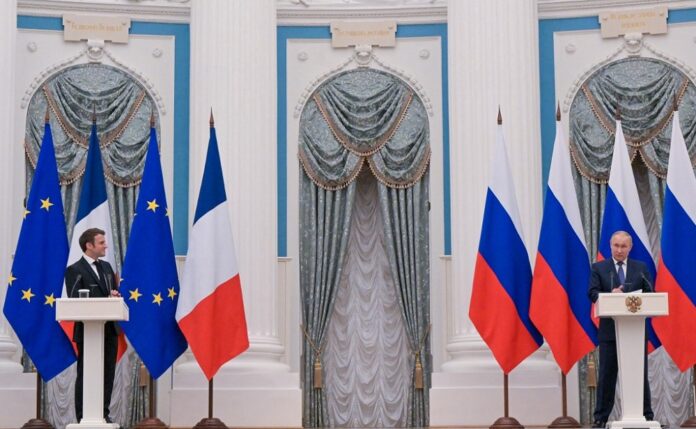Russian President Vladimir Putin (right) and French President Emmanuel Macron attend a joint press conference after meeting in Moscow, early February 8, 2022. — AFP pic
MOSCOW, Feb 8 — The coming days will be crucial in the Ukraine standoff, French President Emmanuel Macron said after the first meeting between a Western leader and Vladimir Putin in Moscow since the Kremlin began massing troops near its neighbour.
Russia, which seized Crimea from Ukraine in 2014 and backs separatists in the east of the country, wants security guarantees including a promise that Nato withdraws some soldiers from nearby countries and never admits Kyiv into the alliance.
Washington has rejected those demands but says it is willing to talk about arms control and confidence-building steps as the powers clash over their spheres of influence in post-Cold War Europe.
Macron, who has pushed his diplomatic credentials as he eyes possible re-election in two months’ time, held more than five hours of talks over dinner yesterday with the Russian president.
“The next few days will be decisive and will require intensive discussions which we will pursue together,” Macron told reporters after the meal, which included reindeer with sweet potatoes and blackberries.
Putin suggested some progress had been made at the summit.
“A number of his ideas, proposals, which are probably still too early to talk about, I think it is quite possible to make the basis of our further joint steps,” he said.
The pair are due to speak again after Macron meets with Ukraine’s leadership, the next stop on his visit to the region and planned for today.
As Russia masses more than 100,000 troops near the Ukraine border, it has said it is not planning an invasion but could take unspecified military action if its security demands are not met. It sees Nato’s addition of 14 new east European members since the Cold War ended three decades ago as an encroachment on its sphere of influence and a threat to its security.
In Washington, US President Joe Biden, hosting German Chancellor Olaf Scholz, said there was still a diplomatic off-ramp to resolve the crisis, stressing the United States and Europe’s biggest economy were “in lockstep.”
The two nations will also ensure sanctions can be imposed quickly on Russia in the event of a fresh attack, Scholz told reporters. “It will have very high costs for Russia.”
More troops arrive
While the West has ruled out defending Ukraine with military force, it has promised to use an arsenal of tools including arms shipments and reinforcement of nearby Nato countries.
Last week, Biden ordered nearly 3,000 US troops to deploy in Poland and Romania to better protect Nato’s eastern flank. Germany announced yesterday it would deploy 350 troops to Lithuania to reinforce a Nato battle group.
On her second visit to Kyiv in three weeks, German Foreign Minister Annalena Baerbock promised unequivocal support, stressing that Germany was willing to pay a high economic price to contain Moscow.
Ukrainian officials have publicly criticised Berlin for refusing to sell defensive weapons to Kyiv and over its perceived reluctance to stop gas flowing through the Nord Stream 2 gas pipeline from Russia if Moscow launches an attack.
Nord Stream 2 is designed to double the amount of gas flowing from Russia straight to Germany, bypassing traditional transit nation Ukraine.
President Joe Biden reiterated yesterday a US threat that the energy project, which is still awaiting final approval, will not go ahead if Russia launches an incursion into Ukraine. He did not specify how he would ensure that.
European countries are heavily reliant on Russian energy, high prices for which are already fuelling inflation.
Central Bank chief Christine Lagarde warned last week of “geopolitical clouds” over the European economy.
Ukrainian Foreign Minister Dmytro Kuleba said “a frank conversation” with Baerbock about weapons had found “both common ground and a draft solution” but did not give details. — Reuters


